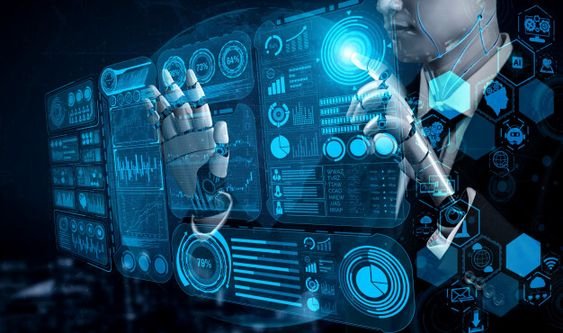
Artificial Intelligence (AI) is transforming many industries, and cybersecurity is no exception. As cyber threats become more sophisticated, traditional security measures are often insufficient to protect against them. AI offers advanced solutions to detect, prevent, and respond to these evolving threats. This article explores the role of AI in cybersecurity and how it is shaping the future of digital protection.
Understanding AI in Cybersecurity
AI in cybersecurity involves using machine learning algorithms, data analytics, and automated processes to enhance the ability to defend against cyber threats. AI systems can analyze vast amounts of data, identify patterns, and detect anomalies that may indicate a security breach. This proactive approach allows for faster and more accurate threat detection and response.
Key Applications of AI in Cybersecurity
1. Threat Detection and Prevention
AI can significantly improve threat detection and prevention by:
– Analyzing Patterns: AI systems can analyze data from various sources, including network traffic, user behavior, and system logs, to identify patterns that may indicate a potential threat. This analysis helps in early detection of attacks.
– Predictive Analytics: AI can predict potential security threats by analyzing historical data and identifying trends. This allows organizations to take preventive measures before an attack occurs.
– Real-Time Monitoring: AI-powered tools can continuously monitor networks and systems in real-time, providing instant alerts for any suspicious activities.
2. Automated Response
AI can automate responses to cyber threats, reducing the time needed to mitigate risks:
– Incident Response: AI can automate incident response processes, such as isolating affected systems, blocking malicious IP addresses, and initiating data recovery procedures. This reduces the impact of an attack and speeds up recovery.
– Adaptive Defense: AI systems can adapt to new threats by learning from previous incidents. This adaptive approach helps in improving defense mechanisms over time.
3. Enhancing Endpoint Security
Endpoints, such as laptops, smartphones, and other devices, are common targets for cyberattacks. AI enhances endpoint security by:
– Behavioral Analysis: AI can analyze the behavior of endpoint devices to detect any unusual activities. For example, if a device starts communicating with a suspicious server, AI can flag this behavior as potentially malicious.
– Device Management: AI can assist in managing and securing endpoint devices by ensuring they comply with security policies, are updated with the latest patches, and are free from vulnerabilities.
4. Phishing Detection
Phishing attacks are a common cyber threat, where attackers trick individuals into providing sensitive information. AI can help detect and prevent phishing by:
– Email Filtering: AI-powered email filters can analyze the content of emails, identify phishing attempts, and block them before they reach the recipient.
– URL Analysis: AI can analyze URLs in emails and web pages to determine if they lead to malicious websites, helping to prevent users from falling victim to phishing scams.
5. User Authentication
AI can enhance user authentication processes to ensure that only authorized individuals have access to sensitive information:
– Biometric Authentication: AI can improve biometric authentication methods, such as facial recognition, fingerprint scanning, and voice recognition, making them more accurate and secure.
– Behavioral Biometrics: AI can analyze user behavior patterns, such as typing speed and mouse movements, to continuously authenticate users. This adds an extra layer of security by detecting anomalies in user behavior.
Benefits of AI in Cybersecurity
The integration of AI in cybersecurity offers several benefits:
– Improved Accuracy: AI can analyze large volumes of data with high accuracy, reducing the chances of false positives and false negatives.
– Speed: AI can process data and identify threats much faster than human analysts, enabling quicker response times.
– Scalability: AI systems can handle vast amounts of data and can be scaled to monitor large networks and systems.
– Continuous Learning: AI systems can learn from new data and adapt to emerging threats, continuously improving their effectiveness.
Challenges of AI in Cybersecurity
While AI offers significant advantages, there are also challenges to consider:
– Data Quality: AI systems rely on high-quality data to function effectively. Inaccurate or incomplete data can lead to incorrect conclusions and ineffective threat detection.
– Complexity: Implementing AI in cybersecurity requires expertise and resources, which may be challenging for some organizations.
– Adversarial Attacks: Cybercriminals can use AI to develop more sophisticated attacks, creating an ongoing arms race between attackers and defenders.
The Future of AI in Cybersecurity
The role of AI in cybersecurity is expected to grow as technology advances. Future developments may include:
– Integration with Other Technologies: AI will likely be integrated with other emerging technologies, such as blockchain and quantum computing, to create more robust cybersecurity solutions.
– AI-Driven Security Operations Centers (SOCs): AI could revolutionize SOCs by automating routine tasks, enabling human analysts to focus on more complex issues.
– Proactive Threat Hunting: AI will enhance proactive threat hunting capabilities, allowing organizations to identify and neutralize threats before they cause harm.
Conclusion
AI is playing a pivotal role in enhancing cybersecurity. Its ability to analyze data, detect threats, automate responses, and continuously learn makes it a powerful tool in the fight against cybercrime. While there are challenges to overcome, the benefits of AI in cybersecurity are undeniable. As technology evolves, AI will continue to shape the future of cybersecurity, providing more effective and efficient ways to protect against cyber threats. For small businesses and large enterprises alike, embracing AI-driven cybersecurity solutions is crucial for staying ahead of cybercriminals and safeguarding sensitive information.








